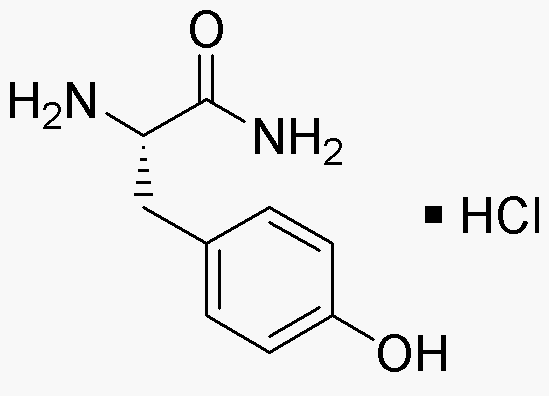L-Tyrosine amide hydrochloride is widely utilized in research focused on:
- Neuroscience: It serves as a precursor for neurotransmitters like dopamine, making it valuable in studies related to mood disorders and cognitive function.
- Pharmaceuticals: This compound is explored for its potential in developing treatments for conditions such as depression and anxiety, providing a natural alternative to synthetic drugs.
- Nutrition: It is used in dietary supplements aimed at enhancing mental performance and reducing stress, appealing to health-conscious consumers.
- Biochemistry: Researchers utilize it in enzyme studies due to its role in protein synthesis, aiding in the understanding of metabolic pathways.
- Cosmetics: The compound is incorporated into skincare products for its antioxidant properties, helping to improve skin health and appearance.
Informations générales
Propriétés
Sécurité et réglementation
Applications
L-Tyrosine amide hydrochloride is widely utilized in research focused on:
- Neuroscience: It serves as a precursor for neurotransmitters like dopamine, making it valuable in studies related to mood disorders and cognitive function.
- Pharmaceuticals: This compound is explored for its potential in developing treatments for conditions such as depression and anxiety, providing a natural alternative to synthetic drugs.
- Nutrition: It is used in dietary supplements aimed at enhancing mental performance and reducing stress, appealing to health-conscious consumers.
- Biochemistry: Researchers utilize it in enzyme studies due to its role in protein synthesis, aiding in the understanding of metabolic pathways.
- Cosmetics: The compound is incorporated into skincare products for its antioxidant properties, helping to improve skin health and appearance.
Documents
Fiches de données de sécurité (FDS)
La FDS fournit des informations de sécurité complètes sur la manipulation, le stockage et l’élimination du produit.
Spécifications du produit (PS)
Le PS fournit une description complète des propriétés du produit, notamment sa composition chimique, son état physique, sa pureté et les exigences de stockage. Il détaille également les plages de qualité acceptables et les applications prévues du produit.
Certificats d'analyse (COA)
Recherchez des certificats d'analyse (COA) en saisissant le numéro de lot du produit. Les numéros de lot et de lot se trouvent sur l'étiquette d'un produit, après les mots « Lot » ou « Lot de fabrication ».
Numéro de catalogue
Numéro de lot/série
Certificats d'origine (COO)
Ce certificat d'exploitation confirme le pays dans lequel le produit a été fabriqué, et détaille également les matériaux et composants utilisés et s'il est issu de sources naturelles, synthétiques ou autres sources spécifiques. Ce certificat peut être requis pour les douanes, le commerce et la conformité réglementaire.
Numéro de catalogue
Numéro de lot/série
Fiches de données de sécurité (FDS)
La FDS fournit des informations de sécurité complètes sur la manipulation, le stockage et l’élimination du produit.
DownloadSpécifications du produit (PS)
Le PS fournit une description complète des propriétés du produit, notamment sa composition chimique, son état physique, sa pureté et les exigences de stockage. Il détaille également les plages de qualité acceptables et les applications prévues du produit.
DownloadCertificats d'analyse (COA)
Recherchez des certificats d'analyse (COA) en saisissant le numéro de lot du produit. Les numéros de lot et de lot se trouvent sur l'étiquette d'un produit, après les mots « Lot » ou « Lot de fabrication ».
Numéro de catalogue
Numéro de lot/série
Certificats d'origine (COO)
Ce certificat d'exploitation confirme le pays dans lequel le produit a été fabriqué, et détaille également les matériaux et composants utilisés et s'il est issu de sources naturelles, synthétiques ou autres sources spécifiques. Ce certificat peut être requis pour les douanes, le commerce et la conformité réglementaire.


